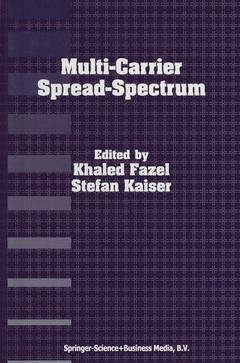Description
Multi-Carrier Spread-Spectrum, Softcover reprint of hardcover 1st ed. 2004
For Future Generation Wireless Systems, Fourth International Workshop, Germany, September 17–19, 2003
Coordinators: Fazel Khaled, Kaiser S.
Language: English
Keywords
Broadband Wireless Access; Demodulation; MIMO; Modulation; Phase; Signal; complexity; integrated circuit; network; online; radio; transmission
Multi-Carrier Spread-Spectrum
Publication date: 12-2010
516 p. · 15.5x23.5 cm · Paperback
Publication date: 12-2010
516 p. · 15.5x23.5 cm · Paperback
Multi-carrier spread-spectrum
Publication date: 12-2003
516 p. · 15.5x23.5 cm · Hardback
Publication date: 12-2003
516 p. · 15.5x23.5 cm · Hardback
Description
/li>Contents
/li>Biography
/li>Comment
/li>
The benefits and success of multi-carrier (MC) modulation on one side and the flexibility offered by the spread spectrum (SS) technique on the other side have motivated many researchers to investigate the combination of both techniques since 1993. This combination known as multi-carrier spread spectrum (MC-SS) benefits from the advantages of both systems and offers high flexibility, high spectral efficiency, simple detection strategies, narrow-band interference rejection capability, etc. The basic principle of this combination is straightforward: The spreading is performed as direct sequence spread spectrum (DS-SS) but instead of transmitting the chips over a single carrier, several sub-carriers are employed. The MC modulation and demodulation can easily be realized in the digital domain by performing IFFT and FFT operations. The separation of the users' signals can be performed in the code domain. MC-SS systems can perform the spreading in frequency direction, which allows for simple signal detection strategies. Since 1993, MC-SS has been deeply studied and new alternative solutions have been proposed. Meanwhile, deep system analysis and comparison with DS-CDMA have been performed that show the superiority of MC-CDMA.
Broadband Wireless Access Based on VSF-OFCDM and VSCRF-CDMA and 3 its Experiments *.- An OFDM Based System Proposal for 4G Downlinks*.- Channel Overloading in CDMA with Scalable Signature Sets and Turbo Detection.- Virtual Subcarrier Assignment (VISA): Principle and Applications.- On Pilot-Symbol Aided Channel Estimation for MC-CDMA in the Presence of Cellular Interference.- New 2D-MC-DS-SS-CDMA Techniques based on Two-dimensional 49 Orthogonal Complete Complementary Codes.- Performance of Multirate Transmission Schemes for MC-CDMA Systems.- Priority Swapping Subcarrier-User Allocation Technique for Adaptive Multi carrier Based Systems.- Sub-band Loading for Pre-Equalized Uplink OFDM-CDMA Systems.- A Study on Subcarrier Power Control of OFDM Transmission Diversity combined with Data Spreading.- Packet Re-Transmission Options for the SS-OFDM-F/TA System.- Comparison of Iterative Detection Schemes for MIMO Systems with Spreading Based on OFDM.- Turbo Product Codes for an Orthogonal Multicarrier DS-CDMA System.- Performance Evaluation of Diversity Gain and Coding Gain in Coded Orthogonal Multi-Carrier Modulation Systems.- Adaptive Coding in MC-CDMA/FDM Systems with Adaptive Sub-Band Allocation.- A Study of Multicarrier CDMA Systems with Differential Modulation.- Spreading Sequences for (Multi-Carrier) MC-CDMA Systems with Nonlinear Amplifier.- Analysis of Linear Receivers for MC-CDMA with Digital Prolate Functions.- Evaluation of Different Spreading Sequences for MC-CDMA in WLAN Environments.- Uplink and Downlink MC-DS-CDMA Synchronization Sensitivity*.- Study of Symbol Synchronization in MC-CDMA Systems.- Iterative Channel Estimation Approach for Space-Frequency Coded OFDM Systems with Transmitter Diversity.- Comparison of Pilot Multiplexing Schemes for ML Channel Estimation in Coded OFDM-CDMA.- Data Aided Channel Estimation for Wireless MIMO-OFDM Systems.- Multi-User Transmissions for OFDM: Channel Estimation and Performances.- Adaptive Pilot Symbol Aided Channel Estimation for OFDM Systems.- Exploiting A-Priori Information for Channel Estimation in Multiuser OFDM Mobile Radio Systems.- Timing of the FFT-Window in SC/FDE Systems.- Equalization for Multi-Carrier Systems in Time-Varying Channels.- Performance Analysis of the Downlink and Uplink of MC-CDMA with Carrier Frequency Offset.- Space Time Multi-User Detection for MC-CDMA Systems in the Presence of Channel Estimation Errors.- Synchronisation and Power Control Processes for Uplink Multicarrier Systems based on MC-CDMA Technique.- A Novel Soft Handoff Technique using STTD for MC-CDMA in a Frequency Selective Fading Channel*.- Array Antenna Assisted Doppler Spread Compensator with Vehicle Speed Estimator for OFDM Receiver.- Pre-Filtering Techniques Using Antenna Arrays for Downlink TDD MC-CDMA Systems.- Downlink Strategies Using Antenna Arrays for Interference Mitigation in Multi-Carrier CDMA.- Antenna Diversity Techniques for SC/FDE — A System Analysis.- Performance of MC-CDMA vs. OFDM in Rayleigh Fading Channels.- Efficient Diversity Techniques Using Linear Precoding and STBC for Multi-Carrier Systems.- Performance of MMSE STBC MC-CDMA over Rayleigh and MIMO METRA Channels.- Comparison between Space-Time Block Coding and Eigen Beamforming in TDD MIMO-OFDM Downlink with Partial CSI Knowledge at the TX Side.- Space-Time Block Coding for OFDM-MIMO Systems for Fourth Generation: Performance Results.- Space-Frequency Coding and Signal Processing for Downlink MIMO MC-CDMA.- Adaptive V-BLAST based Broadband MIMO Systems in Spatially Correlated Channels.- Design of the Low ComplexityTurbo MIMO Receiver for WLAN.- Distributed Multiplexing in Multicarrier Wireless Networks.- An Inter-Cell Interference Suppression Technique Using Virtual Subcarrier Assignment (VISA) for MC-CDMA Uplink.- Synchronism Loss Effect on the Signal Detection at the Base Station using an OFDM-CDMA System.- Minimum BER Multiuser Transmission for Spread-Spectrum Systems in Frequency Selective Channels.- Combined Pre- and Post-Equalization Techniques for Uplink Time Division Duplex MC-CDMA in Fading Channels.- Time Variant Channel Equalization for MC-CDMA via Fourier Basis Functions.- Impact of Channel Variation on a Code Multiplexed Pilot in Multicarrier Systems.- Joint Compensation of IQ Imbalance, Frequency Offset and Phase Noise.- Practical Issues of PIC in MC-CDMA Systems.- OFDM, DS-CDMA and MC-CDMA Systems with Phase Noise and Frequency Offset Effects.- A New Phase Noise Mitigation Method in OFDM Systems with Simultaneous CPE and ICI Correction.- Performance Comparison of OFDM Transmission affected by Phase Noise with and without PLL.
Stefan Kaiser was the first researcher to address the institutional and legal aspects of the future air navigation systems in a pioneering thesis presented to the Institute of Air and Space Law, McGill University.
Aims to edit the ensemble of the newest contributions and research results in this new field that have been presented during the 4th International Workshop on Multi-Carrier Spread-Spectrum (MC-SS 2003), held in Oberpfaffenhofen, Germany
© 2024 LAVOISIER S.A.S.




